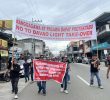DAVAO CITY – An official of the Davao City Investment Promotion Center said they are looking at around four percent increase in terms of capitalization in businesses in Davao City for 2015.
Officer-in-charge Ivan Cortez said that the number of business establishments rose to around 37,000 based on the data from the city’s Business Bureau from January to November 2015.
Cortez said the estimate also included establishments with pending approval until December 2015.
He said last 2014 there were 26,000 business establishments registered in the business bureau.
“As of November our total capitalization of all businesses registered is P214 billion. In 2014, our total capitalization for the whole year was P211 billion,” he said.
Cortez said the leading sectors are property development and retail services.
“If we look around the city, there are a lot of sprouting convenience stores led by 7-11. We’re actually servicing the consumer demand of people flocking to Davao City ,” he said.
Cortez said the city is looking at 70 7-11 outlets by June this year.
He also said BPO and retail industry lead in the investments in Davao City.
Department of Industry 11 Regional Director Belinda Ambi said the region has a total of P1.4 billion of total investment in the Philippine Board of Investments (BOI), an attached agency of DTI.
She said most of these investments are located in Davao City.
“Most of these investments are real properties, so we have subdivisions-development, high-rise condominium units, and Information-Communication Technology,” said Ambi.
Cortez added that the capitalization is still conservative.
“If you’re familiar with how people are declaring capitalization at the business bureau, usually these are conservative declarations. So if you’re base is P214 billion you are looking at doubling that money as what’s circulating really in Davao,” he said.
Cortez said Davao City offers a market with a healthy return of investment and encouraging environment for business.
“Businesses continue to enjoy healthy ROI and the environment for business is encouraging,” he said.
He said he does not see “any saturation happening in the next three years because the market for Davao are not really for Davao City alone.”
“These properties are being built for people who are planning to migrate to Davao. So most of your customer base for condos are not for Davao City residents,” said Cortez.
Ambi added that the absorptive capacity for the service sector for the incoming migrants in Davao City “is still very huge.”
“Among the micro, small, and medium enterprises (MSMEs) establishing in the region, the service sector accounts for almost 50 percent,” she said.
Aside from property development, Ambi said they are sill looking at the big potential of agricultural commodities in Davao Region.
“These are still potential areas where jobs can be absorbed: agri business, service sector and trading. We are advocating for value-adding of our agri commodities. We are still looking at our cacao, coconut, banana. Some of this is traditional, but we have new products out of these industries. So these are still work in progress,” she said. (davaotoday.com)








